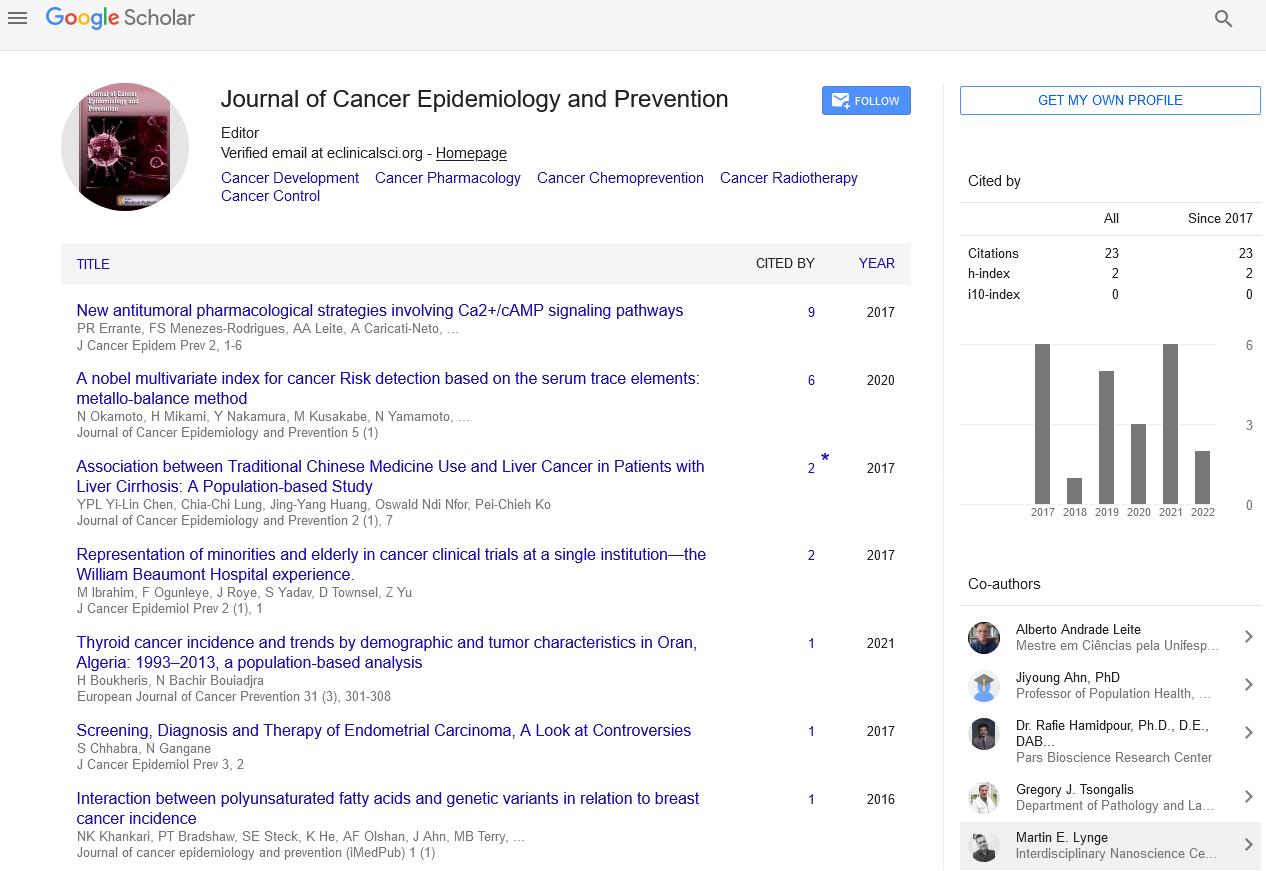Perspective - (2021) Volume 6, Issue 6
A Brief Note on Cancer Prevention and Chemotherapy
Hamidpour*
Department of Epidemiology and Biostatistics, University of South Carolina, Columbia, SC, 29208, USA
*Correspondence:
Hamidpour, Department of Epidemiology and Biostatistics,
University of South Carolina, Columbia, SC, 29208,
USA,
Email:
Received: 03-Dec-2021
Published:
24-Dec-2021
Cancer Prevention
Cancer prevention is the practice of taking proactive steps to
reduce the incidence and death of cancer. Individual efforts to
improve lifestyle and seek preventative screening, as well as
macroeconomic or public policy related to cancer prevention all
have a role in cancer prevention. Because of its application to
broad populations, ability to reduce long-term impacts of cancer
by promoting proactive health skills and procedures, and
anticipated cost-effectiveness and viability for all socioeconomic
groups, transnational cancer prevention is seen as a vital goal.
The majority of cancer cases are caused by environmental
contamination that is passed down through the generations as
epigenetic damage, and many, but not all, of these
environmental causes are within our control. Tobacco,
overweight/obesity/obesity, an inadequate diet, physical
inactivity, alcohol, sexually transmitted illnesses, and air
pollution are all risk factors that can be avoided. Some
environmental causes, such as naturally existing background
radiation, are uncontrollable, and other cancers are caused by
hereditary genetic abnormalities. In the future, current gene
editing techniques could be used as preventative measures.
Future preventive screening approaches can also be enhanced
by reducing invasiveness and enhancing specificity by taking into
account individual biologic make-up, commonly known as
"population-based individualised cancer screening."
Chemotherapy
Chemotherapy (abbreviated as chemo, CTX, or CTx) is a cancer treatment that involves the administration of one or more anticancer medications (chemotherapeutic agents) as part of a standardized chemotherapy protocol. Chemotherapy can be given with the goal of curing cancer (which almost always requires a combination of drugs) or with the goal of extending life or reducing symptoms (palliative chemotherapy). Chemotherapy is one of the most important aspects of medical oncology, which is the discipline of medicine that deals with cancer medication.
Chemotherapy is evolved to symbolize its use of non-specific intracellular poisons to obstruct mitosis (cell division) or cause DNA damage, which is why DNA repair inhibition can be employed alongside chemotherapy. Chemotherapy's negative connotation hinders the development of more targeted drugs that interrupt extracellular signals (signal transduction). Hormonal therapies limit growth-promoting signals from conventional endocrine hormones by specifically targeting molecular or genetic targets (primarily estrogens for breast cancer and androgens for prostate cancer). Various inhibitions of growth signals, such as those related to receptor tyrosine kinases, are referred to as targeted therapy.
Importantly, drugs (whether chemotherapy, hormonal therapy, or targeted therapy) are classified as systemic cancer therapy because they are injected into the circulation and so have the ability to treat cancer throughout the body. Systemic therapy is frequently used in concert with other cancer therapies classed as local therapy (i.e., treatments whose efficacy is confined to the anatomic location in which they are administered), such as radiation therapy, surgery, or hyperthermia therapy.
Traditional chemotherapeutic medications kill cancer cells by interfering with cell division (mitosis), however cancer cell susceptibility varies widely. Chemotherapy can be seen as a way to harm or stress cells, which can result in cell death if apoptosis is induced. Damage to normal cells that divide quickly and are thus sensitive to anti-mitotic medications, such as cells in the bone marrow, digestive system, and hair follicles, is responsible for many of the diseases. As a result, the following are the most prevalent chemotherapy side effects: Myelosuppression (lower blood cell production, resulting in immunosuppression), mucositis (inflammation of the digestive tract lining), and baldness (hair loss).Due to their influence on immune cells (especially lymphocytes), chemotherapy drugs are widely utilised in a variety of illnesses characterised by harmful immune system over activity toward self (so-called autoimmunity). Rheumatoid arthritis, systemic lupus erythematosus, multiple sclerosis, vasculitis, and other autoimmune diseases are among them.
Citation: Hamid pour (2021) A Brief Note on Cancer Prevention and Chemotherapy. J Cancer Epidemiol Prev. Vol.6 No.6:009.
Copyright: This is an open access article distributed under the terms of the Creative Commons Attribution License, which permits unrestricted use, distribution, and reproduction in any medium, provided the original work is properly cited.

